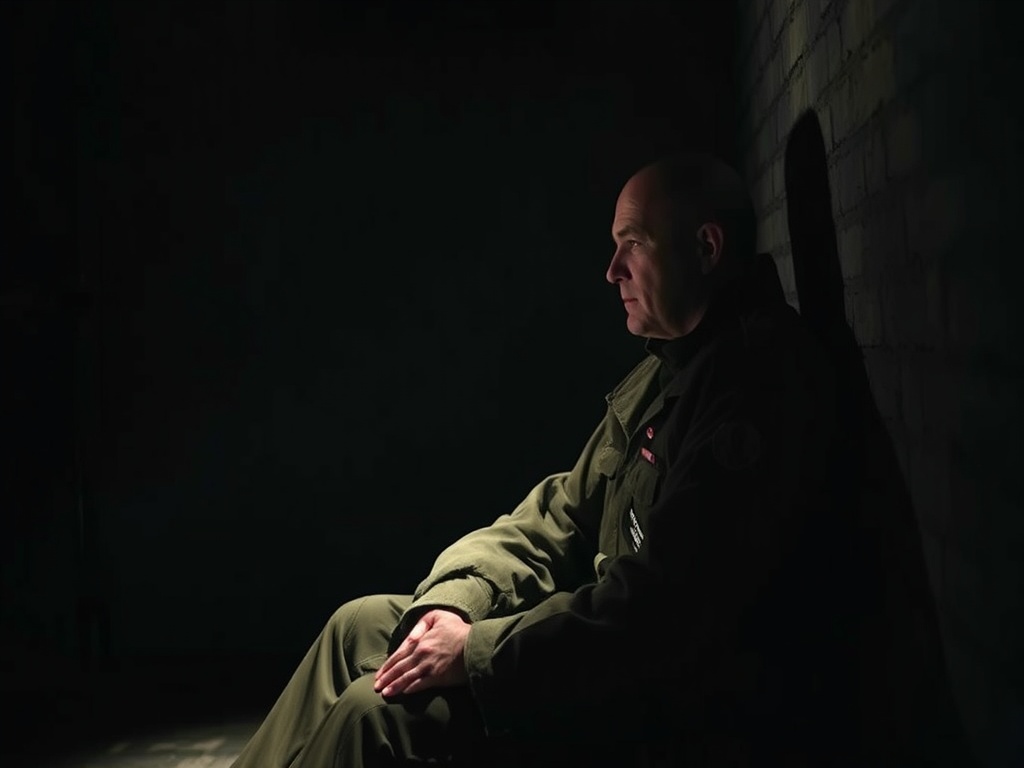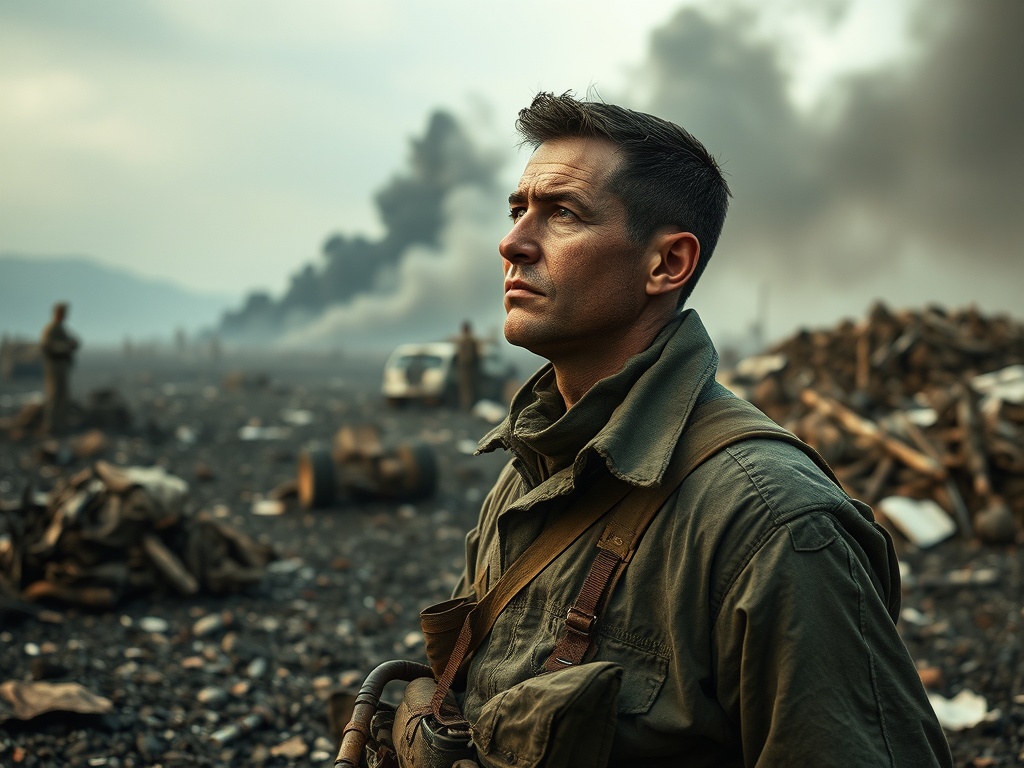Fighting on the Frontline: Shaun Pinner’s Story

The two British soldiers huddled in their snowbound trenches understood the gravity of the situation as Russian forces prepared to advance. For weeks, they had endured relentless harassment from drones equipped with thermal imaging cameras, artillery bombardments, and mortar attacks, all leading up to Moscow’s full-scale invasion. Shaun Pinner and Aiden Aslin, who had entrenched themselves in the frontline fields outside Mariupol—a strategic city on Ukraine’s southeastern coast—braced for the impending storm.
Pinner, originally from Watford and now a section commander in the Ukrainian marines, delivered a resolute message to Vladimir Putin’s troops: “We don’t have air superiority. We don’t have a formidable naval fleet. But Ukrainians fight. So we’ll give them a bloody nose, that’s for sure.” He vividly recalled the eerie silence that enveloped them in those agonizing hours before Russia launched its all-out assault on February 24, 2022, a pre-dawn offensive that reshaped the world.
As the third anniversary of the invasion approaches, Pinner, now 51, reflects on the weeks of harrowing combat in which his unit engaged in fierce, close-quarters battles against the Russians before he was ultimately captured. His six-month ordeal at the hands of Russian-backed forces culminated in a death sentence that he had to endure.
Facing the Onslaught
Pinner recounted how, on the first day of the full-scale invasion, he found himself at the tip of the spear. “I was 800 meters forward of the first line in an advanced listening post. I couldn’t have been any further forward without being in Russian territory,” he stated. That day, they fought for 11 grueling hours against overwhelming odds—artillery strikes, Grad rockets, and air superiority made their situation dire. “We were now the Taliban. They were taking prisoners because our left flank just crumbled,” he recalled.
Despite commanding the second most powerful army in the world, Putin underestimated Ukraine’s resolve, believing he could capture Kyiv within two weeks. However, the “bloody nose” that Pinner vowed to deliver saw Ukraine resist heroically in this largest conflict in Europe since World War II, inflicting staggering casualties on the invading forces. According to one NATO official, Russia had sustained approximately 837,000 soldiers killed or wounded since the conflict began.
A Life Changed
Pinner, who served nine years in the Royal Anglian Regiment, including a tour in Bosnia with the United Nations, had relocated to Ukraine in 2018. He met his wife in Mariupol and later joined the 36th Brigade of the Ukrainian marines, contributing to the country’s military resurgence following Russia’s annexation of Crimea. As Kyiv’s future teetered on a knife’s edge, Pinner emphasized the importance of Ukraine’s battlefield victories despite Russia’s overwhelming military power. “Three years later, we’re still fighting. In some areas, Putin hasn’t advanced even 50 kilometers past his own border,” he explained.
- “We’ve sunk over 30 percent of his Black Sea Fleet.”
- “We’ve reclaimed over 50 percent of the territory initially occupied in 2022.”
- “We’re not losing this.”
Yet, Pinner expressed concern about international politics, specifically regarding former President Donald Trump’s comments that he felt could embolden Putin. “Ukrainians are worried that Trump is giving Putin a lifeline,” he asserted.
The Prelude to War
Back in February 2022, as tens of thousands of Russian troops amassed at the border, Pinner’s brigade sensed that war was imminent. One night, his unit received orders to prepare for an assault—something he had heard numerous times in both of his military careers, but this time, it was undeniably real.
“We just had to wait for it to start,” he said. The increased artillery shelling two weeks prior to the invasion had made it clear that an attack was imminent. “We could see the drones, and they dropped ordinance at night, which was pretty new. They had thermal capability, and everything was changing quite quickly,” he noted.
During the first day of combat, his unit managed to avoid casualties but had to retreat to a second line of defense. Over the course of a grueling week, the marines mounted a fighting withdrawal back to Mariupol. In temperatures plummeting to -10°C, sleep became a luxury, and the soldiers found themselves utterly exhausted.
Captivity and Survival
As the fighting intensified, Pinner described terrifying close-quarter combat during the subsequent seven weeks, where they fought valiantly while encircled in the Illich steelworks. “It was like scenes from Saving Private Ryan, hand-to-hand combat with the enemy breaching our compound. By that time, we were running low on ammunition, food, and water,” he recounted. Tragically, they had lost 60 percent of their platoon to injuries and fatalities, and were left running on empty.
Russian forces even drove a train loaded with 800 kilograms of explosives into their position, creating a massive crater that injured him and left him with flash burns. However, as losses mounted, Pinner was compelled to leave the hospital despite his injuries and rejoin the frontline.
Eventually, with their position becoming untenable, the troops attempted to break out, but Pinner was captured by the so-called Donetsk People’s Republic forces. His six months in captivity were marked by horrific torture, including being stabbed in the leg, electrocuted, tasered, and beaten brutally. His weight plummeted as he subsisted on meager scraps.
In a sham trial where he was not allowed to plead not guilty, Pinner was sentenced to death alongside Aslin. After enduring a final brutal beating that left him scarred and bloodied, he was released, along with fellow British captives Aslin, Andrew Hill, John Harding, and Dylan Healy. Their escape on a luxurious jet took an unexpected turn when they spotted Roman Abramovich, the then-owner of Chelsea, with Pinner jokingly discussing buying his own team, West Ham.
Life After Captivity
Now working with the anti-mining group Prevail and residing in Dnipro, Pinner states that he has largely avoided mental health issues stemming from his captivity, attributing greater emotional weight to the loss of friends and his home due to the war. In a critical view of international politics, he accused Trump of trying to undermine Ukraine’s defense efforts, citing the former president’s labeling of Volodymyr Zelensky as a dictator while seeking a peace deal with Russia.
“Trump seems to rattle off Russian narratives every single day. I don’t think there’s going to be peace, because Putin still wants Kyiv,” he warned. “Zelensky can’t be bought. He’s certainly not going to be bought by Putin, and he’s not going to be bought by Trump.”
Pinner believes it is vital to discuss the ongoing situation in the UK, as he foresees a potential escalation into conflict with Russia. “I think we’re already at war with Russia; it’s just that nobody is saying it,” he remarked. He has documented his experiences in an autobiography titled Live, Fight, Survive, which is currently being adapted into a Hollywood film by actor Tom Hardy.




